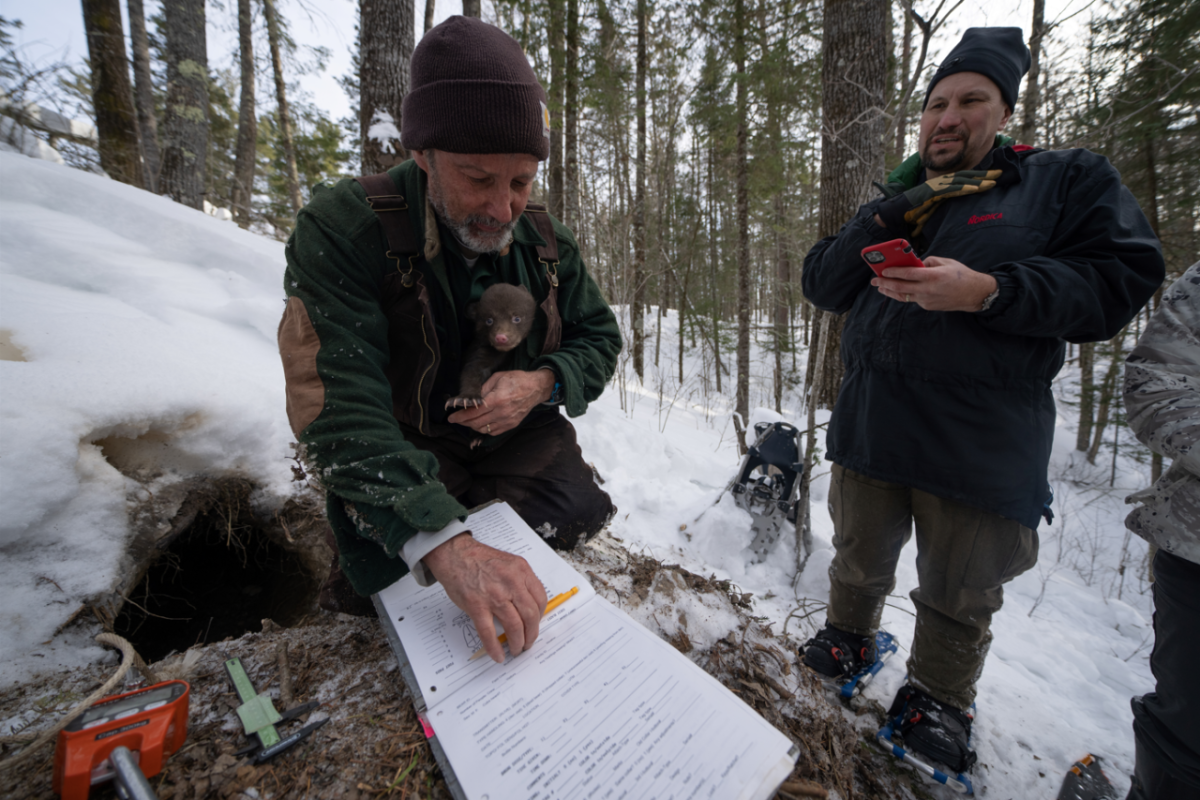How Healthcare Technology Is Changing Wildlife Conservation
A Medtronic engineer is helping the planet — one bear at a time
How healthcare technology is changing wildlife conservation
Tim Laske crouched in the snow between a bear and her den, downloading her heart rate data onto a computer. That data was recorded by an insertable cardiac monitor one-third the size of a AAA battery.
The Medtronic Reveal LINQ™ Insertable Cardiac Monitor is helping researchers like Laske, Vice President of Research and Business Development for the Cardiac Ablation Solutions business at Medtronic, learn characteristics of wild and endangered species to further conservation efforts.
For hours on a cold February day, he and a team of wildlife biologists worked with care to gather information about the 204-pound hibernating bear and her cubs.
“Just like a human patient, the welfare of the bear is the first priority,” he said.
He’s been studying the physiology of bears since 1999, publishing dozens of studies—one of which caught the eye of the Smithsonian’s National Zoo and Conservation Biology Institute (SCBI).
Rosana Moraes, Senior Research Fellow at the Smithsonian, remembers the exact moment she encountered his study on the stress response of wild bears to drone flights through cardiac monitoring.
“When I saw that data, I envisioned all the possibilities we could do with a tool like that,” she said.
The Rhythm of Life study was born.
Using Medtronic-donated LINQ insertable cardiac monitors, Moraes and her colleagues are tracking heart rates of maned wolves, oryx, and jaguars to gain insight into stressors and what can be addressed in the environment to create better conditions for wildlife.
With human populations expanding rapidly, wildlife has a harder time adapting. So, the heart rhythm data, combined with research about their movement and other physiological markers, is providing vital information to help the animals survive.
And according to Moraes, the data could eventually have an even broader impact. She discovered something unexpected stemming from the research—empathy.
“Generating this kind of data has tremendous benefit to human beings because people can connect more with wildlife,” she said. “It’s very beneficial for people to think of the heart of the animal responding to emotions like we do. Long-term, it’s creating another generation of conservationists.”
‘The potential is limitless’
When Laske — a Bakken Fellow, which is the highest technical honor at Medtronic — isn’t dressed head to toe in wool and snowshoeing to bear dens, he’s scouting for promising technologies and businesses for Medtronic to acquire.
But it’s his work with conservation biology as a professor at the University of Minnesota’s Visible Heart® Laboratories that combines his expertise and passion for biomedical engineering with wildlife, fulfilling a boyhood dream.
“It's been a dream come true to be able to be an engineer and to be a wildlife biologist,” he said.
Laske loves being in the field, but as a scientist, he gets just as excited to get back to the office and open the data files.
“Part of our Mission at Medtronic is to be good global citizens. So that means that we should be helping take care of the planet, helping take care of one another, the environment, and the species in it,” Laske said.
Julie Brewer, President of the Cardiovascular Diagnostics and Services business at Medtronic that donates the cardiac monitors, shares the sentiment.
"It is amazing to see how scientists and researchers are using our Reveal LINQ ICM technologies to help inform wildlife conservation efforts and improve our understanding of how these remarkable creatures are impacted by their ever-changing environment,” she said. "We are thrilled that Medtronic could play a small role by providing technology that may help improve animal well-being and support future conservation actions for these vulnerable animal populations.”
In some ways, despite launching in 2017, the Smithsonian’s study is just getting started. This summer, it’s re-introducing the maned wolves to the wild for further study. And there are plans to include penguins and elephants in upcoming research.
“They have a global reach with researchers all around the world,” Laske said. “The potential of this is really limitless now.”
Learn more about how Medtronic is protecting our planet here.



